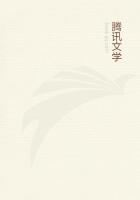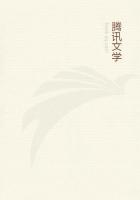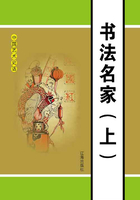Aristophanes was 'profane,' under satiric direction, unlike his rivals Cratinus, Phrynichus, Ameipsias, Eupolis, and others, if we are to believe him, who in their extraordinary Donnybrook Fair of the day of Comedy, thumped one another and everybody else with absolute heartiness, as he did, but aimed at small game, and dragged forth particular women, which he did not. He is an aggregate of many men, all of a certain greatness. We may build up a conception of his powers if we mount Rabelais upon Hudibras, lift him with the songfulness of Shelley, give him a vein of Heinrich Heine, and cover him with the mantle of the Anti-Jacobin, adding (that there may be some Irish in him) a dash of Grattan, before he is in motion.
But such efforts at conceiving one great one by incorporation of minors are vain, and cry for excuse. Supposing Wilkes for leading man in a country constantly plunging into war under some plumed Lamachus, with enemies periodically firing the land up to the gates of London, and a Samuel Foote, of prodigious genius, attacking him with ridicule, I think it gives a notion of the conflict engaged in by Aristophanes. This laughing bald-pate, as he calls himself, was a Titanic pamphleteer, using laughter for his political weapon; a laughter without scruple, the laughter of Hercules. He was primed with wit, as with the garlic he speaks of giving to the game-cocks, to make them fight the better. And he was a lyric poet of aerial delicacy, with the homely song of a jolly national poet, and a poet of such feeling that the comic mask is at times no broader than a cloth on a face to show the serious features of our common likeness.
He is not to be revived; but if his method were studied, some of the fire in him would come to us, and we might be revived.
Taking them generally, the English public are most in sympathy with this primitive Aristophanic comedy, wherein the comic is capped by the grotesque, irony tips the wit, and satire is a naked sword.
They have the basis of the Comic in them: an esteem for common-sense. They cordially dislike the reverse of it. They have a rich laugh, though it is not the gros rire of the Gaul tossing gros sel, nor the polished Frenchman's mentally digestive laugh. And if they have now, like a monarch with a troop of dwarfs, too many jesters kicking the dictionary about, to let them reflect that they are dull, occasionally, like the pensive monarch surprising himself with an idea of an idea of his own, they look so. And they are given to looking in the glass. They must see that something ails them. How much even the better order of them will endure, without a thought of the defensive, when the person afflicting them is protected from satire, we read in Memoirs of a Preceding Age, where the vulgarly tyrannous hostess of a great house of reception shuffled the guests and played them like a pack of cards, with her exact estimate of the strength of each one printed on them: and still this house continued to be the most popular in England; nor did the lady ever appear in print or on the boards as the comic type that she was.
It has been suggested that they have not yet spiritually comprehended the signification of living in society; for who are cheerfuller, brisker of wit, in the fields, and as explorers, colonisers, backwoodsmen? They are happy in rough exercise, and also in complete repose. The intermediate condition, when they are called upon to talk to one another, upon other than affairs of business or their hobbies, reveals them wearing a curious look of vacancy, as it were the socket of an eye wanting. The Comic is perpetually springing up in social life, and, it oppresses them from not being perceived.
Thus, at a dinner-party, one of the guests, who happens to have enrolled himself in a Burial Company, politely entreats the others to inscribe their names as shareholders, expatiating on the advantages accruing to them in the event of their very possible speedy death, the salubrity of the site, the aptitude of the soil for a quick consumption of their remains, etc.; and they drink sadness from the incongruous man, and conceive indigestion, not seeing him in a sharply defined light, that would bid them taste the comic of him. Or it is mentioned that a newly elected member of our Parliament celebrates his arrival at eminence by the publication of a book on cab-fares, dedicated to a beloved female relative deceased, and the comment on it is the word 'Indeed.' But, merely for a contrast, turn to a not uncommon scene of yesterday in the hunting-field, where a brilliant young rider, having broken his collar-bone, trots away very soon after, against medical interdict, half put together in splinters, to the most distant meet of his neighbourhood, sure of escaping his doctor, who is the first person he encounters. 'I came here purposely to avoid you,' says the patient. 'I came here purposely to take care of you,' says the doctor. Off they go, and come to a swollen brook. The patient clears it handsomely: the doctor tumbles in. All the field are alive with the heartiest relish of every incident and every cross-light on it; and dull would the man have been thought who had not his word to say about it when riding home.
In our prose literature we have had delightful Comic writers.
Besides Fielding and Goldsmith, there is Miss Austen, whose Emma and Mr. Elton might walk straight into a comedy, were the plot arranged for them. Galt's neglected novels have some characters and strokes of shrewd comedy. In our poetic literature the comic is delicate and graceful above the touch of Italian and French. Generally, however, the English elect excel in satire, and they are noble humourists. The national disposition is for hard-hitting, with a moral purpose to sanction it; or for a rosy, sometimes a larmoyant, geniality, not unmanly in its verging upon tenderness, and with a singular attraction for thick-headedness, to decorate it with asses'
ears and the most beautiful sylvan haloes. But the Comic is a different spirit.















